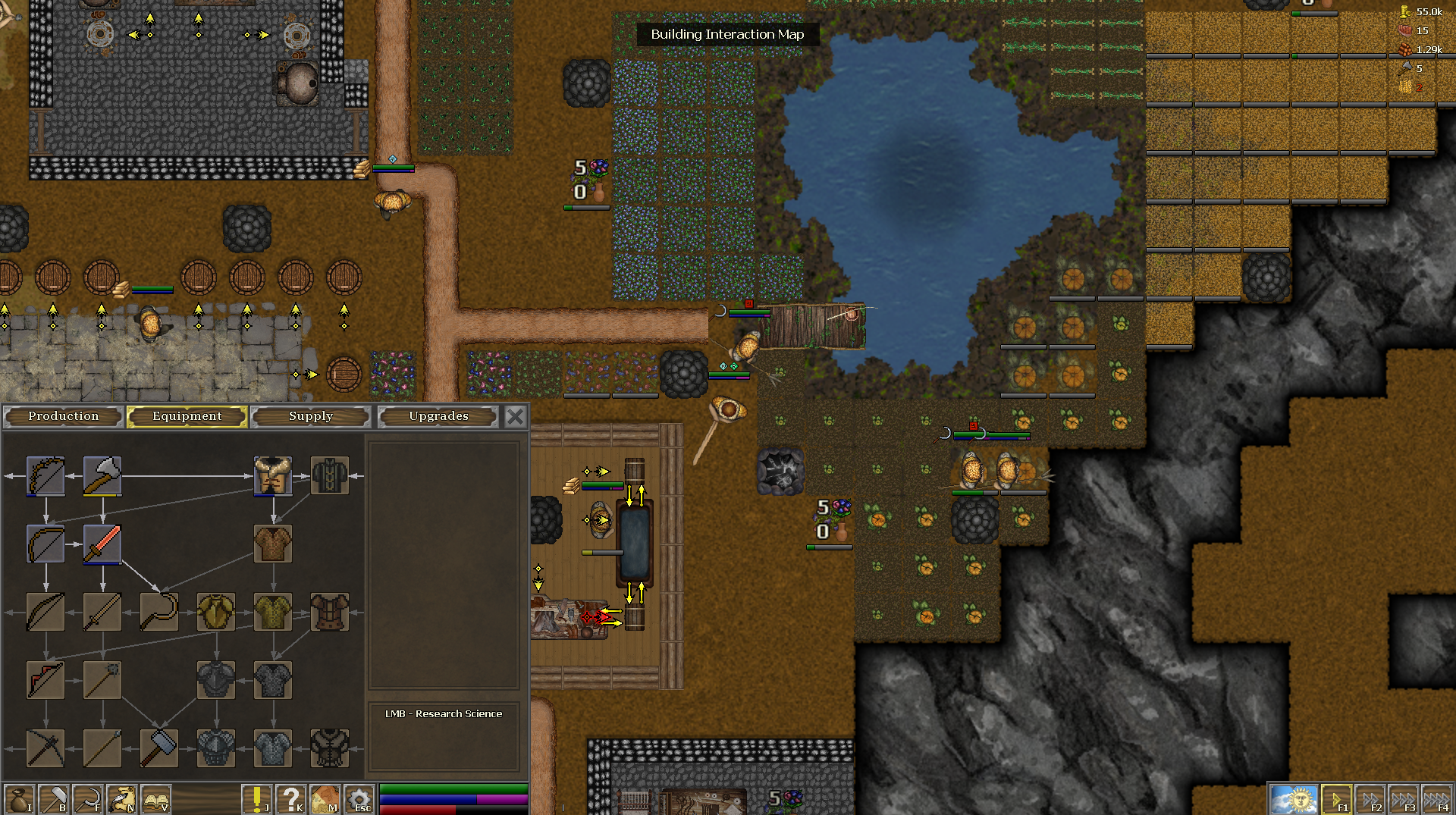Take your seat on the throne as you guide a growing hamlet from its initial founding to a bustling village in this medieval town-building simulation.
Type: Single-player
Genre: Simulation, Strategy
Developer: Harpoon Games
Publisher: Harpoon Games,
Gamera Games
Release date: 30 November, 2017


Overview
First Feudal is a town-building simulation firmly set into a realistic medieval world. There are no dragons, wizards, or magical swords, only the harsh realities of the middle ages as your feudal lord struggles to overcome them and establish a thriving settlement that can succeed and expand against these odds.
This Is My Land
Your experience is kicked off by a settings screen that allows you to tailor the map that you will be playing on to your preferences. There are currently a dozen sliders on this screen including options such as hunger rate, peasant arrival rate, frequency of attacks, and amount of forest that you can play around with to keep the game fresh but I decided to leave everything at the default for both of the games that I played. You’ll also be able to name your dynasty and upon completing this you are brought into the game world and you will assume the role of your feudal lord. The first of many optional quests is to construct a gathering place that will likely serve as something of a town center for you, at least for a time. This location will act as a place to store items and for an area that idle peasants will gather, and two of these peasants will be arriving immediately upon your construction of it. Your career as a rather modest lord begins.
Your overall goal is to see this plot of land evolve into a busy, productive settlement and there are a number of options on what role your feudal lord will play in it all. They can have a direct impact on the development of your hamlet by joining in at the ground level and performing actions like harvesting trees, hunting animals, or sawing planks from wood, or they can sit upon their throne which will allow you to delegate tasks and view your domain more efficiently and be an experience more reminiscent of other games in the genre. Although this reduces the overall manpower available to improve your settlement, you may find the trade-off to be worth it and, conveniently, if you do, while your feudal lord is seated upon their throne their maximum stamina and hunger no longer decay over time. I found that a balance between these options was how I preferred to play; when everything was moving along smoothly, I focused on observing and delegating while any complication that arose resulted in a decision to hop down from the throne and roll up my sleeves. Is the settlement running low on stone without a peasant to spare? Well then, it’s time to grab a pickaxe and hit the quarry myself!
Your primary focus in First Feudal is not only to survive but to improve your hamlet and there are a number of elements of gameplay that are required for you to find success in this endeavor. Compared to other games in the genre, First Feudal, at least in its current state, tends to be similar but somewhat streamlined. Food, morale, fatigue, and so forth are all present here but not particularly challenging to manage once you achieve a basic understanding of them.
In addition to having your own character to play as in the world, the science system stood out as relatively unique in the genre. There is no researcher profession that your peasants can be assigned nor is there any tangible research mechanic that is set in place; you gain new technologies simply by gaining experience in their prerequisites. This means that if you’re determined to unlock the technology to work with bronze, you had best get to work on getting experience with copper and tin. Although these technologies are split into three separate tech trees (production, equipment, and supply), there is a fourth that works with a different set of mechanics titled “upgrades” that uses upgrade points to acquire passive buffs as opposed to the tangible technologies of the other trees. Conveniently, all of these technologies are separate from one another and, as you never choose a focus, every tech churns along at its own pace meaning they are unlocked based entirely on whichever activities are most common among you and your peasants.
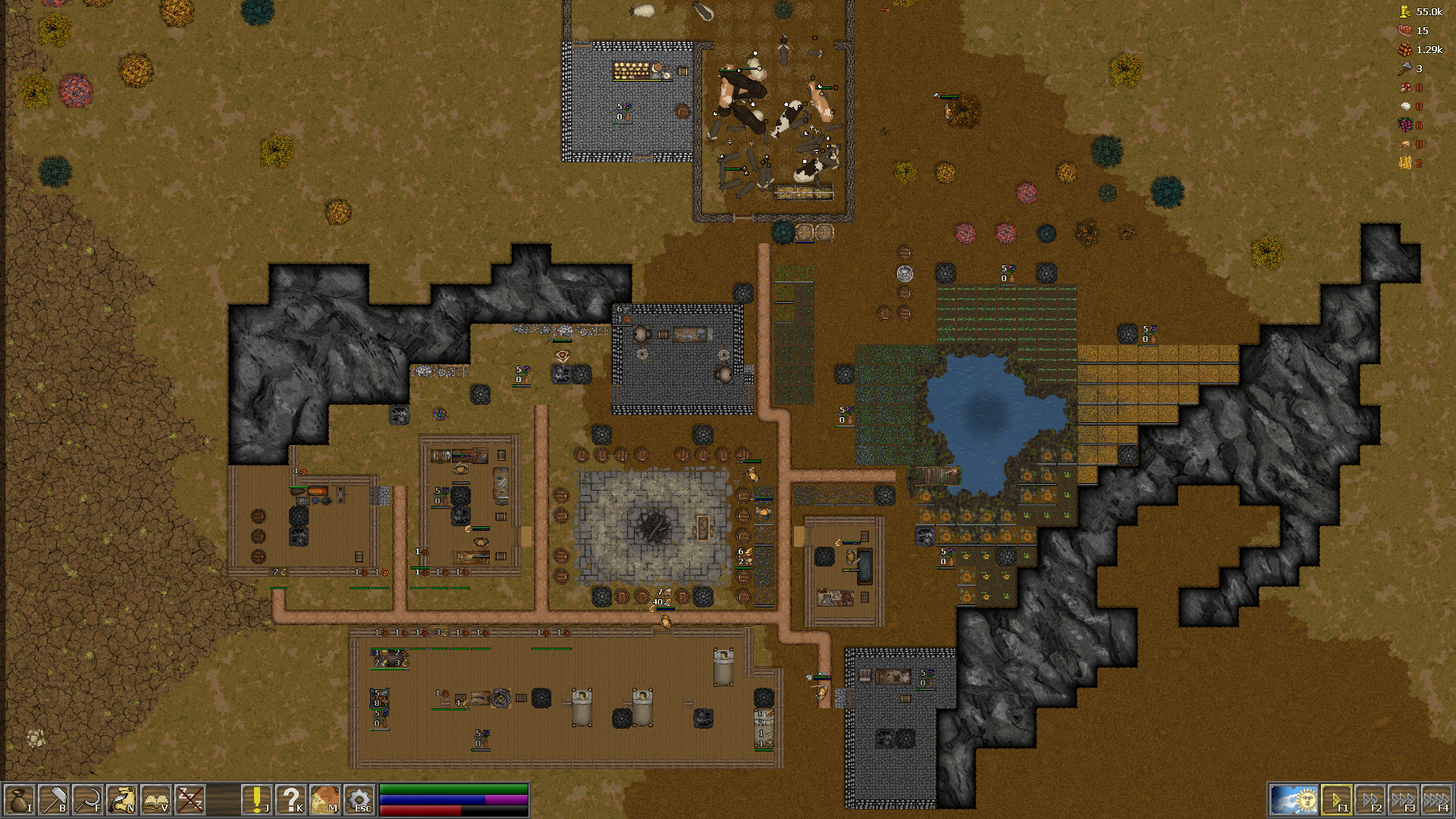
The Peasantry And Their Noble Lord
Speaking of the peasants, you can freely assign them professions at any given time as long as the basic requirements for it have been met. They do not have specific skills as you might see in other games of the genre and are instead defined by their stats, traits, and whatever buffs and debuffs they have at the time. Each of the four stats mark them as better or worse at certain tasks while their traits determine their fairly unique characteristics; one peasant may be a nature lover and receive a happiness bonus from being inside even when they are outside while another is gifted and increases their four basic stats more quickly. These rules apply to your character as well and as your hamlet grows so will you, your character improving by the work that they do with the added bonus of you being able to decide on the traits that your feudal lord develops. Buffs and debuffs, on the other hand, tend to be tied to current circumstances, if the peasant is inside they will receive a happiness buff while they will receive a movement debuff if they are walking through a floodplain.
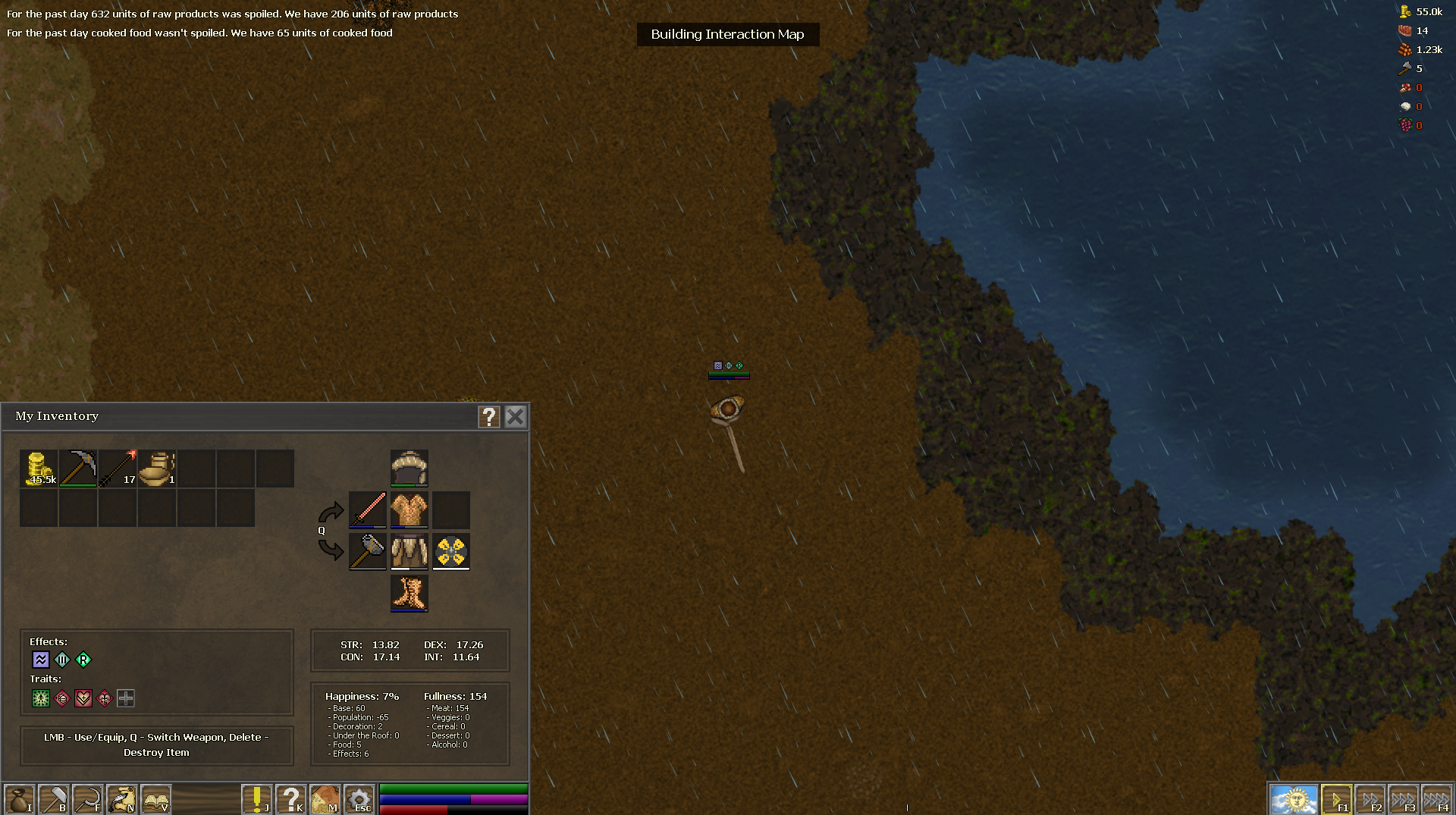
What Is Solid?
There are a number of aspects of First Feudal that I have been enjoying. The first of these is the ability to control your own character within the community that you are building and being able to take a hands-on approach in its labors. Combine this with the fact that your feudal lord gains skills and traits as the game progresses and it has a rather simplistic, but rare in the genre, action-RPG feel at times. The in-game encyclopedia was also a hit with me; many in this genre require you to figure significant portions of the game out on your own or rely on having the wiki at your disposal as you play. First Feudal requires neither and if you are struggling with a concept, it is most likely described in at least moderate detail within this feature.
The atmosphere of the game is enjoyable. The graphics are what you expect after even a brief glance at the game’s screenshots and there is nothing more, nothing less than that. The music is hit or miss for me, leaning toward a hit. Much of the soundtrack in the game is enjoyable and adds to the atmosphere and a few of the songs I have really enjoyed while my settlement has grown. On the other hand, I would have preferred a few of the tracks to be a bit more medieval-sounding in their approach, this is particularly the case when it comes to the combat music which is pretty much just metal.
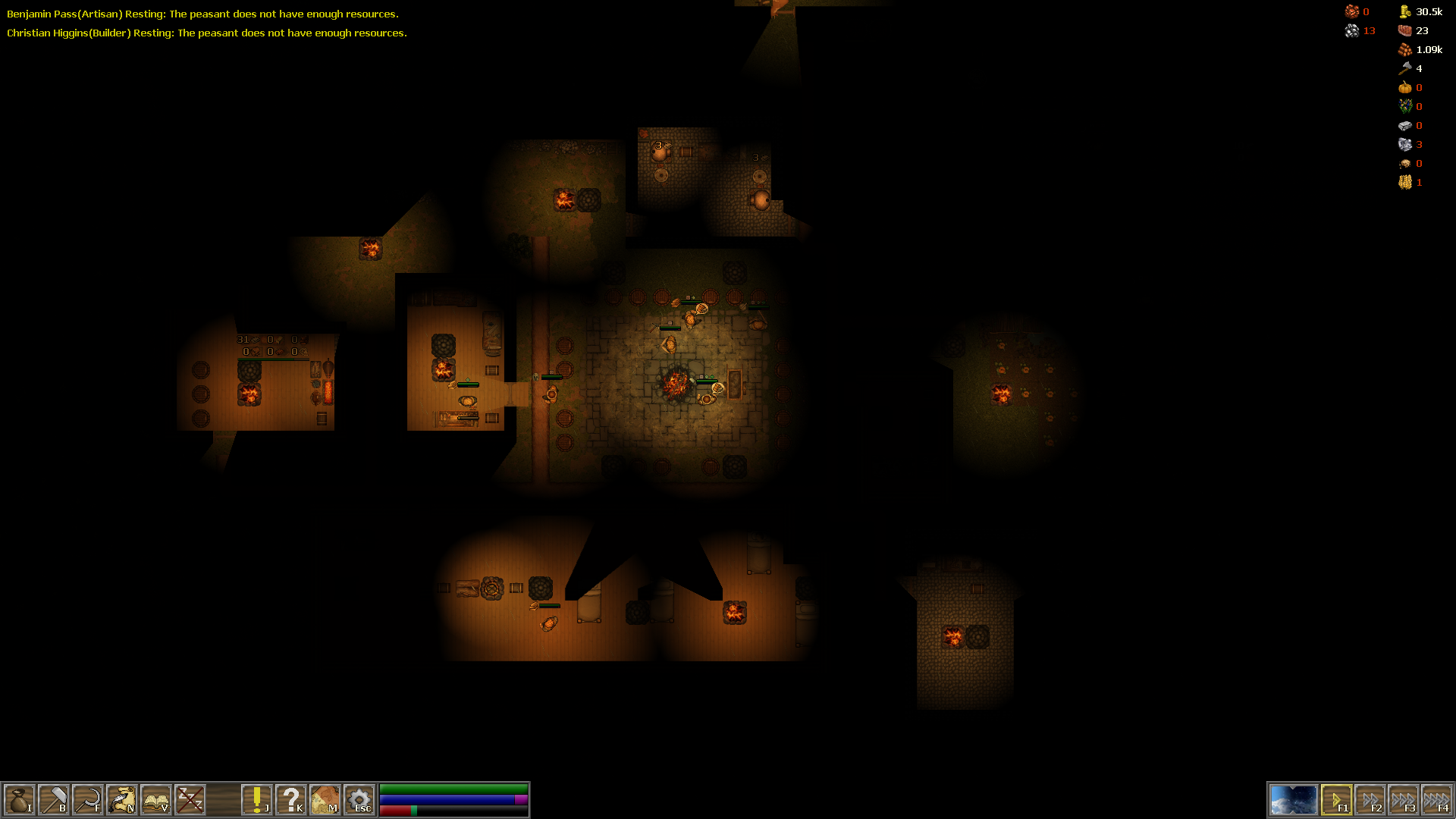
What’s The Catch?
The majority of what I’m about to detail here can be summed up by saying that First Feudal is still noticeably in an early access state. For starters, the peasant AI can be quite flawed at times and does very little thinking for itself. On multiple occasions, a peasant would stand around at the gathering place and a notification would appear that they were unable to work due to the fact that there were no jobs for them to do. This was inaccurate as I had personally set guidelines for a certain number of items that were produced by their profession that were left unfulfilled with plentiful resources at their disposal. At other times, if they weren’t micromanaged, I would see a hunter tear through my livestock pastures to kill a single creature with a sword that was swinging in a wide arc hitting everything within reach or a woodcutter using a much more expensive to produce and less effective sword to cut down a tree instead of dipping into the plentiful stock of axes that I had on reserve. I’d certainly like to see all of this improved by the game’s release.
Although the notifications are already helpful, I would like to see more details to assist in resolving the issue. It was not rare in the mature stages of my settlement that I would be notified that one of my peasants could not work due to a lack of resources, but there were no specifics involved and it often resulted in a short but irritating period of time where I was investigating throughout each of my production stations to discover which items weren’t being produced. A late-game artisan, for example, could potentially have a very large number of tasks that they perform that fall under their responsibilities. There’s no question that more details throughout would lead to a more entertaining experience.
Oddly enough, the only character that is capable of taming animals is the feudal lord. I’m uncertain whether this is a design choice or not but I’m going to assume that it isn’t as, beyond the obvious, taming an animal is as simple as walking up to it and clicking on it with a rope equipped. After leading it back to a pen and more or less staking it there, it’s domesticated. This is either a bizarrely simple design choice for this genre or the overall taming process is still a placeholder for a system that is coming later.
I played with the default settings of the game but I would suggest that the game is far too easy all the same. Throughout the lifespan of both of my hamlets, I never experienced an event that put me at any significant risk; every bandit invasion was swiftly dealt with, there was always enough food, and my most feared foe was always the AI of my own peasants. At the time of writing this review, I wouldn’t even be able to detail the specifics of traps, walls, towers, or gates as I never actually got to the point where I felt using my resources to construct them was worth it. To add on to this point, I noticed that the battles were increasingly more in my favor as the game progressed, an experience vastly different from others in the genre where there are frequently times when I scramble to prepare for the next threat.
Oh, and I would have liked to see the speed of new peasant arrivals increased as well. I felt that I spent a significant amount of time waiting for new arrivals for new improvements and expansion projects that were held back simply because I needed my manpower elsewhere to keep the hamlet functioning.
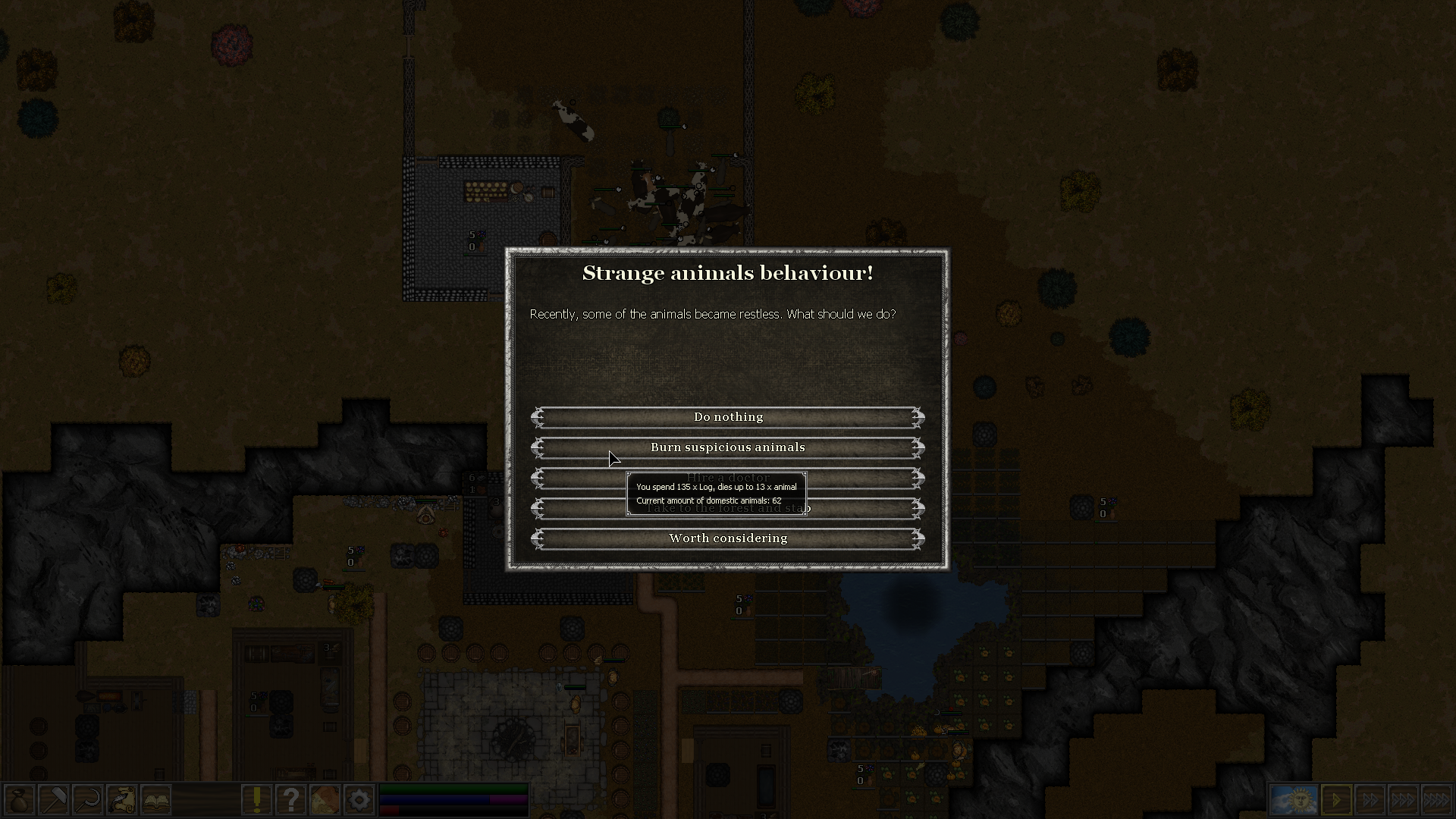
Verdict
First Feudal is currently in a state of development that would lead an optimist to say that it will eventually become a great addition alongside the likes of RimWorld or Dwarf Fortress. As of this review, it certainly has such potential but it has a long way to go. The game seems to be updated at a steady pace over the last year, though the last two or three months seem to have been devoted to translating the game into a new language as opposed to developing new content, at least according to their news releases on Steam. I’ve enjoyed my time with the game but I wouldn’t choose to play it over some of the other incredible heavyweights in the genre, not currently anyway.
Here’s to hoping for continued improvements and content additions in the future!
